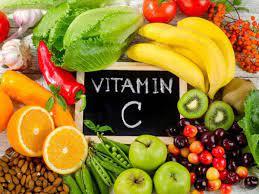Vitamin C, also known as ascorbic acid, is a type of vitamin that easily dissolves in water. Being water-soluble, it can be transported to the body’s tissues but isn’t stored efficiently. As a result, it is necessary to consume it daily through food or supplements.
Some key functions of vitamin c:
Antioxidant Protection:
Vitamin C acts as a powerful antioxidant, neutralizing harmful free radicals in the body and protecting cells from oxidative damage.
Collagen Synthesis:
Vitamin C plays a crucial role in the synthesis of collagen, a protein essential for the health and maintenance of connective tissues, skin, blood vessels, and bones.
Wound Healing:
Vitamin C aids in the formation of new connective tissue and promotes wound healing by supporting the production of collagen.
Immune System Support:
Vitamin C enhances the function of various immune cells, helping to strengthen the immune system and protect against infections.
Iron Absorption:
Vitamin C improves the absorption of non-heme iron (found in plant-based foods) in the intestines, enhancing iron availability for the body’s needs.
Neurotransmitter Production:
Vitamin C is involved in the synthesis of neurotransmitters such as serotonin, dopamine, and norepinephrine, which play crucial roles in mood regulation and cognitive function.
Antihistamine Effect:
Vitamin C possesses antihistamine properties that can help alleviate symptoms of allergies and reduce histamine levels in the body.
Cardiovascular Health:
Vitamin C supports the health of blood vessels and may help lower the risk of cardiovascular diseases by reducing oxidative stress and improving endothelial function.
Eye Health:
Vitamin C, along with other antioxidants, helps protect the eyes from damage caused by free radicals, reducing the risk of age-related macular degeneration (AMD) and cataracts.
Skin Health:
Vitamin C promotes the production of collagen, which contributes to the elasticity, firmness, and overall health of the skin. Please note that these functions are based on general knowledge, and individual experiences may vary.
Here are some common food sources that are rich in vitamin C:
Citrus Fruits:
Oranges, grapefruits, lemons, and limes are excellent sources of vitamin C.
Berries:
Strawberries, blueberries, raspberries, and blackberries are packed with vitamin C.
Kiwi:
Kiwi fruit is a delicious source of vitamin C.
Tropical Fruits:
Pineapple, mango, papaya, and guava are tropical fruits that provide a good amount of vitamin C.
Bell Peppers:
Both red and green bell peppers are rich in vitamin C.
Leafy Greens:
Spinach, kale, and Swiss chard are examples of leafy greens that contain vitamin C.
Broccoli:
This cruciferous vegetable is a great source of vitamin C.
Tomatoes:
Tomatoes, whether eaten raw or in cooked form, are a good source of vitamin C.
Strawberries:
These juicy fruits are not only delicious but also high in vitamin C.
Melons:
Watermelon and cantaloupe are refreshing fruits that supply a decent amount of vitamin C.
It’s worth noting that vitamin C can be sensitive to heat and light, so consuming these foods raw or lightly cooked can help preserve the vitamin content.
Here are some common problems associated with vitamin C deficiency:
Impaired Collagen Synthesis:
Without sufficient vitamin C, collagen production is disrupted, leading to weakened connective tissues and impaired wound healing.
Weak Immune System:
A deficiency in vitamin C can weaken the immune system, making individuals more susceptible to infections, frequent colds, and respiratory illnesses.
Increased Oxidative Stress:
Inadequate levels of vitamin C can result in increased oxidative stress, which may contribute to cellular damage and chronic diseases.
Fatigue and Weakness:
Vitamin C deficiency can cause fatigue, weakness, and a general feeling of malaise.
Oral Health Issues:
Insufficient vitamin C levels can lead to oral health problems, including bleeding gums, swollen or inflamed gums, and tooth loss.
Anemia:
Vitamin C deficiency can contribute to the development of anemia, specifically a type called iron-deficiency anemia.
Mood and Mental Health Issues:
Inadequate vitamin C levels may contribute to mood disorders, including depression and anxiety.
It’s important to note that vitamin C deficiency is relatively rare in developed countries due to the availability of vitamin C-rich foods and dietary supplements.

